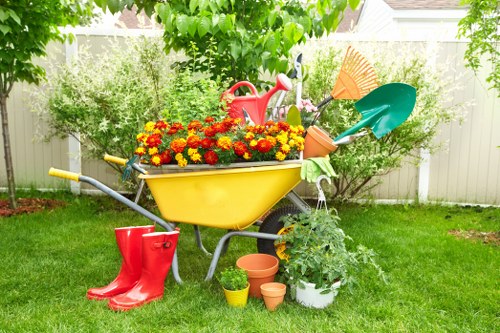Effective Cleaners for Oven Cleaning

Keeping your oven clean is essential not only for maintaining its appearance but also for ensuring it operates efficiently. Over time, grease, food spills, and grime can accumulate, making it harder to cook and potentially affecting the taste of your food. Fortunately, there are various cleaners in oven cleaning that can help you achieve a spotless oven with minimal effort.
Choosing the right cleaner is crucial. Not all products are created equal, and some might be more effective or safer to use than others. In this article, we will explore different types of oven cleaners, their benefits, and tips for using them effectively.
Whether you prefer commercial products or natural solutions, there is a method that will suit your needs. Let's dive into the world of oven cleaning and discover the best cleaners to keep your kitchen appliance in top condition.
Types of Oven Cleaners

There are primarily two categories of oven cleaners: chemical-based and natural. Each has its advantages and drawbacks, depending on your preferences and requirements.
Chemical-Based Cleaners: These are commercially available cleaners that typically contain powerful chemicals like sodium hydroxide or potassium hydroxide. They are designed to break down tough grease and baked-on food quickly.
Advantages of chemical cleaners include their effectiveness and speed. They can clean your oven thoroughly within a short period, often requiring just a few minutes of waiting time.
Natural Cleaners

For those who prefer eco-friendly and less toxic options, natural cleaners are an excellent choice. Common ingredients include baking soda, vinegar, lemon juice, and salt. These substances are safe to use and environmentally friendly.
Benefits of natural cleaners:
- Non-toxic and safe for households with children and pets.
- Environmentally friendly with minimal chemical waste.
- Often cheaper and readily available.
While natural cleaners may require more elbow grease and time compared to their chemical counterparts, they are effective for regular maintenance and light to moderate cleaning tasks.
Choosing the Right Oven Cleaner

When selecting an oven cleaner, consider the following factors to ensure you choose the best option for your needs:
- Severity of the Mess: For heavily soiled ovens, chemical-based cleaners might be more effective. For regular maintenance, natural cleaners could suffice.
- Safety: If you have children or pets, opt for non-toxic, natural cleaners to avoid chemical exposure.
- Environmental Impact: Choose eco-friendly cleaners if sustainability is a priority for you.
- Cost: Compare the prices and effectiveness to find a product that offers the best value for your money.
By evaluating these factors, you can make an informed decision that aligns with your cleaning needs and personal preferences.
How to Use Chemical Cleaners Effectively

Using chemical-based oven cleaners requires careful handling to ensure safety and effectiveness. Follow these steps for optimal results:
- Preparation: Ensure the oven is turned off and completely cool before starting. Remove any oven racks, trays, and other accessories.
- Application: Spray the cleaner evenly across the interior surfaces, avoiding heating elements. Make sure to cover all greasy and stained areas.
- Waiting Period: Allow the cleaner to sit for the recommended time, usually between 20 minutes to several hours, depending on the product instructions.
- Scrubbing: After the waiting period, use a scrub brush or sponge to remove loosened grime. For stubborn spots, reapply the cleaner and repeat the process.
- Rinsing: Wipe down all surfaces with a damp cloth to remove any residual cleaner. It's essential to remove all chemical residues to avoid contamination of your food.
- Final Cleaning: Replace the oven racks and any other accessories. Your oven should now be clean and ready for use.
Always follow the manufacturer's instructions when using chemical cleaners. Wear protective gloves and ensure proper ventilation in your kitchen to minimize exposure to fumes.
Natural Cleaning Methods

For those who prefer a more natural approach, here are some effective methods to clean your oven using household ingredients:
Baking Soda and Vinegar
This combination is a classic natural cleaning solution. Baking soda acts as a mild abrasive, while vinegar helps to break down grease and eliminate odors.
- Steps:
- Remove oven racks and apply a paste of baking soda and water to the interior surfaces.
- Let the paste sit overnight to loosen the grime.
- The next day, spray vinegar over the baking soda paste. This will cause a fizzing reaction that helps lift away the residues.
- Wipe down the oven with a damp cloth, removing all remnants of the paste.
This method is effective and leaves your oven smelling fresh without the use of harsh chemicals.
Lemon Juice and Salt
Lemon juice is not only a natural disinfectant but also leaves a pleasant scent. When combined with salt, it becomes a potent cleaner that can tackle stubborn stains.
How to Use:
- Squeeze fresh lemon juice over the stains in your oven.
- Sprinkle salt generously over the areas where you applied the lemon juice.
- Let the mixture sit for 30 minutes to an hour.
- Use a sponge or cloth to scrub away the loosened grime.
- Wipe the oven clean with a damp cloth.
This method not only cleans effectively but also helps to deodorize your oven naturally.
Preventative Measures for a Cleaner Oven

Regular maintenance can significantly reduce the need for deep cleaning and prolong the lifespan of your oven. Here are some tips to keep your oven clean consistently:
Use Oven Liners
Oven liners are designed to catch spills and drips, preventing them from reaching the oven's interior. They are easy to remove and clean, saving you time and effort.
Wipe Spills Immediately
Addressing spills and splatters as soon as they occur can prevent them from baking onto the oven surfaces. Keep a damp cloth nearby for quick clean-ups.
Cover Food Dishes
Using covers or lids on dishes containing liquids or greasy foods helps minimize the amount of splatter inside the oven. This simple habit can keep your oven much cleaner.
Regular Heating Cycles
Occasionally run your oven on a self-cleaning cycle if it has one. This feature uses high heat to burn off residues, making cleaning easier.
Choosing the Right Tools
In addition to cleaners, having the right tools can make oven cleaning more efficient:
- Scrub Brushes: Use non-abrasive brushes to avoid scratching the oven surfaces.
- Microfiber Cloths: These are excellent for wiping down surfaces without leaving streaks.
- Gloves: Protect your hands from harsh chemicals and hot surfaces.
- Spray Bottles: Useful for applying cleaning solutions evenly.
Investing in quality cleaning tools can make the process smoother and more effective.
Safety Tips for Oven Cleaning

Cleaning your oven safely is paramount to prevent accidents and ensure effective results. Here are some essential safety tips:
Ventilation
Always ensure your kitchen is well-ventilated when using chemical cleaners. Open windows and use fans to disperse fumes, reducing the risk of inhalation.
Protective Gear
Wear gloves and, if necessary, protective eyewear to shield your skin and eyes from harsh chemicals and splashes.
Avoid Mixing Cleaners
Never mix different cleaning agents, especially those containing bleach and ammonia, as this can create toxic fumes.
Read Instructions Carefully
Before using any cleaner, read the label and follow the manufacturer's instructions to ensure proper and safe usage.
Proper Storage
Store cleaning products out of reach of children and pets. Keep them in their original containers with labels intact for easy identification.
Eco-Friendly Oven Cleaning Practices
Adopting eco-friendly cleaning practices not only benefits the environment but also promotes a healthier home. Here are some ways to make your oven cleaning routine more sustainable:
- Use Reusable Cleaning Cloths: Instead of disposable wipes, opt for washable microfiber cloths.
- Make Your Own Cleaners: Utilize natural ingredients like baking soda, vinegar, and lemon juice to create effective cleaning solutions.
- Reduce Water Usage: Use minimal water by applying cleaning solutions directly and wiping efficiently.
- Recycle Packaging: Dispose of or recycle cleaning product containers responsibly.
Incorporating these practices can lead to a cleaner oven and a greener lifestyle.
Professional Oven Cleaning Services
If you find oven cleaning to be too time-consuming or challenging, professional services are available to help. Hiring experts ensures a thorough and safe cleaning process, especially for ovens with severe buildup or specialized features.
Benefits of Professional Cleaning
- Comprehensive cleaning without the need for personal labor.
- Access to professional-grade cleaners and equipment.
- Expertise in handling different types of ovens and cleaning challenges.
- Time-saving, allowing you to focus on other tasks.
When choosing a professional service, consider their reputation, experience, and the methods they use to ensure your oven is cleaned effectively and safely.
How to Choose a Service
Look for companies that are experienced, have positive reviews, and use environmentally friendly cleaning products if that aligns with your values. Request quotes and compare services to find the best fit for your needs.
Maintaining Your Clean Oven
Once your oven is clean, maintaining its condition is easier if you follow a few simple practices:
- Wipe down spills immediately after each use.
- Use the oven's self-cleaning feature periodically if available.
- Keep the oven door closed when not in use to prevent dust accumulation.
- Regularly clean oven racks and accessories.
Consistent maintenance can extend the life of your oven and keep it functioning efficiently.
Common Mistakes to Avoid
When cleaning your oven, avoid these common pitfalls to ensure safety and effectiveness:
Ignoring Safety Precautions
Always prioritize safety by using protective gear and ensuring proper ventilation. Neglecting these can lead to harmful exposures and accidents.
Overusing Cleaners
Using too much cleaner can damage the oven surfaces and leave harmful residues. Follow the recommended amounts for optimal results.
Not Following Instructions
Each cleaner has specific instructions for use. Skipping steps or not adhering to guidelines can reduce the effectiveness of the cleaning process.
Using Abrasive Tools
Avoid using harsh scrubbers or abrasive tools that can scratch and damage your oven's interior. Opt for soft sponges or brushes instead.
Conclusion
Maintaining a clean oven is essential for both the appliance's longevity and the quality of your cooking. By selecting the right cleaners in oven cleaning, whether chemical-based or natural, and following proper cleaning techniques, you can keep your oven spotless with ease.
Remember to prioritize safety, use the appropriate tools, and adopt regular maintenance practices to reduce the need for deep cleaning. If you ever feel overwhelmed, don't hesitate to seek professional help to ensure your oven remains in optimal condition.
Contact us today to learn more about our professional oven cleaning services and keep your kitchen sparkling clean!

